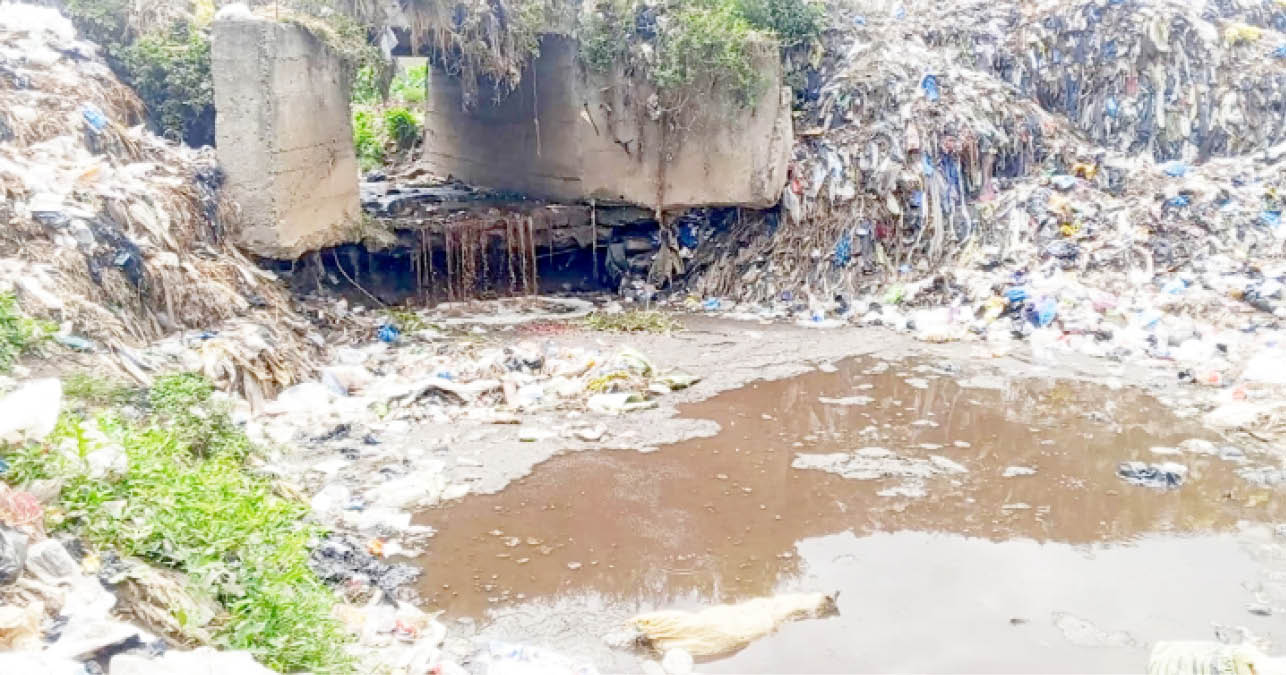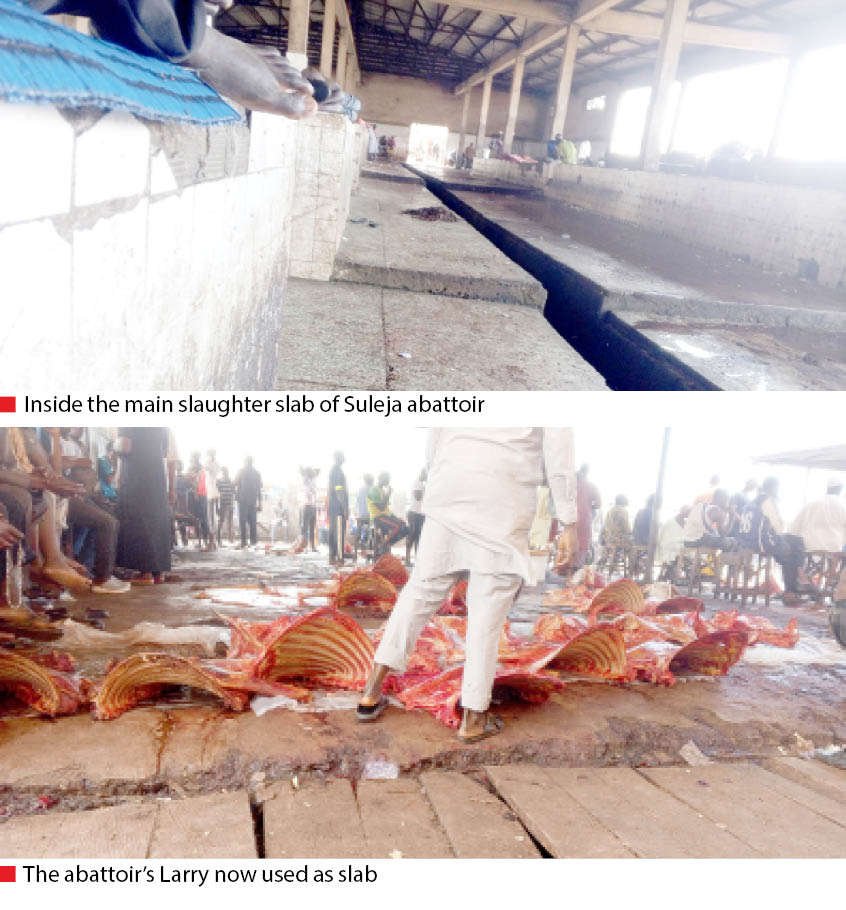Residents worry over activities, state of Suleja abattoir
There is a growing concern over the activities and condition of the Suleja abattoir in Niger State, which was built during the first tenure of the late governor, Abdulkadir Kure. The facility is battling to regain its main goal – keeping a hygienic environment. It was gathered that the abattoir was a replacement to a […]

A stream where solid waste from the abattoir flows into
There is a growing concern over the activities and condition of the Suleja abattoir in Niger State, which was built during the first tenure of the late governor, Abdulkadir Kure. The facility is battling to regain its main goal – keeping a hygienic environment.
It was gathered that the abattoir was a replacement to a previous one formerly situated around the commercial town’s main market, considered as small and very close to residential buildings.
During a recent visit to the site by Daily Trust Saturday, stakeholders there, who appeared to be worried about its condition, were, however, skeptical to speak openly for the fear of being witch-hunted by the Suleja Local Government Council, the custodian of the abattoir and the main beneficiary of the revenue generated at the facility.
It was learnt that there are two different concerns from two different quarters respectively. While butchers and other stakeholders within the abattoir are more concerned about lack of functional amenities, as well as the dilapidated condition of the slaughterhouse’s slab, residents, traders and building owners around the facility, are worried about the dumping of solid waste around the facility, as well as air pollution from smoke, which is affects them negatively.
We’ll make it mandatory for INEC to upload results — Senate
35 days to deadline: Stakeholders doubt December handover date of Port Harcourt Refinery
It was revealed that about 300 cattle are being slaughtered at the facility on average days, with more than 80 per cent of the meat transported to various markets, restaurants and hotels around the Federal Capital Territory (FCT).
It was also gathered that N800 out of each N1,000 charged on each slaughtered cow goes to Suleja Local Government, while the remaining N200 is shared among butchers’ union, Sarkin-Fawa Council (butchers’ chief) and Sarkin-Zango, who rules the livestock market section opposite the abattoir.

Some butchers who spoke to Daily Trust Saturday under the condition of anonymity lamented that in spite of the revenue generation, the local government council had failed to carry out any meaningful renovation on the facility since its inception. They maintained that the council was more concerned about allocating additional shop spaces to interested individuals.
They also lamented lack of adequate water needed to make the facility hygienic, as well as failure of the government to construct an access road to link the facility to the main road, which they said had been a source of worry to motorists and commuters, especially during the rainy season.
Others lamented improper waste disposal, especially on water channels. Also, the place that is supposed to serve as the venue for veterinary doctors to ascertain the health status of animals by veterinary doctors ahead of slaughtering, has reportedly been converted to a mini slab as the main slab inside the slaughtering building is no longer meeting its growing demand.
There are also cases of inadequate manpower in both the veterinary and cleaning personnel attached to the abattoir under the payroll of the Suleja Local Government.
Other issues raised by butchers include lack of vans to convey meat from the abattoir to various destinations as opposed to the use of motorcycles or rickety vehicles.
Malam Haruna Alhassan, the chairman of the Kara section of the abattoir, where cattle are kept on arrival before slaughtering, said while some were kept for fattening, others would be sold for slaughtering once they are certified by veterinary doctors, who now use a new place around the site.
He described the section as the lifeline of the abattoir, where cattle are sold to butchers, either in full payment or on loan, based on the butcher’s financial capacity.
He urged Suleja Area Council to provide the section with borehole, which can be used to feed the animals without relying on commercial water vendors.
Residents lament water, air pollution
Lamenting over the state of the abattoir, Aliyu Abdullahi, a resident of one of the neighbouring communities, said that at times he would shut down his shop as a result of smoke emanating from the facility, which he said would usually take over the sky around his community.
“It is affecting us seriously. They use all kinds of rubber in roasting the slaughtered animals,” he said.
Another resident, Muktar Alkali, lamented that their series of complaint to some stakeholders there didn’t make any positive impact, adding, ”They are more powerful than us in business, so there’s nothing we can do about it except to continue begging the government to intervene.”
Towards the main road leading outside the abattoir is the Suleja building materials market, where traders are also concerned about the odour emanating from the facility.
Patrick Chima, one of the traders there described the odour as very offensive, saying it has been affecting their health and disturbing their customers.
Daily Trust Saturday also spoke to people at the nearby Zuma Rock College of Health Technology, one of institutions situated opposite the Suleja-Madalla road.
Abdullahi Bawa, the head of the Department of Health of the institution, said students, lecturers and other members of staff of the school experienced a terrible situation, especially once it is mid-day when solid waste is being dumped. He said the smell was always very offensive owing to the intensity of the sun. He added that smoke from the abattoir also finds its way into the college despite the considerable distance between them.
Expert speaks on dangers of pollution, proffers alternative means
Dr Hassan Abubakar, a former Director of the Abuja Environmental Protection Board (AEPB), spoke about the negative impacts of the activities in and around the abattoir and how it could be dealt with.
He said, “Honestly, that abattoir constitutes a very serious nuisance. In fact, it has been a problem since I was the director of the AEPB. At one point I had to even send a team comprising environmental health and safety staff, in conjunction with veterinary doctors, to go there and sensitise the stakeholders.
“The smoke flying into the air and solid waste flowing indiscriminately into the nearby stream without any kind of control constitute danger to the lives of human beings living in Suleja. The smoke goes into the air being inhaled by the butchers themselves and other people in the nearby community.
It bears chemicals and intoxicants that cause a lot of problems. It is the same thing with the solid waste that goes through a lot of permutations. And once it is fermented, it produces a smell that bears infection and microbe bacteria, which are very dangerous to humans living around there.
The remaining ones that didn’t fly with the solid waste would contaminate the water, and that is one of the causes of typhoid and gastroenteritis once consumed by humans, either directly or indirectly through the water or vegetables that came into contact with it, he said.
Abubakar further said the sensitisation carried out at the time was out of the fact that about 80 per cent of meat processed from the Suleja abattoir was transported to the FCT.
He advised Suleja Local Council and the Niger State Government to save the situation by inviting investors and partners, either locally or overseas to manage the abattoir, as according to him, waste is now wealth.
“The waste can be used in generating biogas, as well as fertiliser that can be useful to farmers. The same can be done with the slaughtered animal’s blood and bones, which is vital in fish and poultry feeds,” he said.
He added that the area council could relocate the abattoir to another suitable place that is far from residents and convert the present one into something different and safer to humans.
We signed MoU with a solid waste control firm – Area council boss
Reacting, the chairman of Suleja Local Government, Isyaku Bawa Naibi, said the council had signed a memorandum of understanding with a firm to recycle solid waste from the abattoir into fertiliser.
He blamed past administrations for allowing residential buildings close to the abattoir, while maintaining that his administration would only become one year in the middle of December. He also insisted that the revenue generated from the facility was not up to what people may think as it is subject to maneuvering from various stakeholders.
Speaking about the failure to construct the road that links the facility to the main road, Naibi disclosed that it had been included in the 50-kilometer road project promised by the state government at each of the four main towns of the state.
